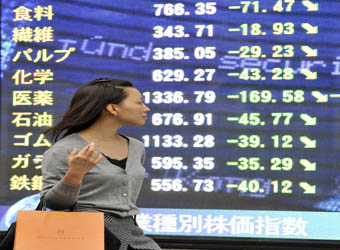In Japan, the Nikkei 225 added 0.59 percent, while the Topix traded near flat. Across the Korean Strait, the Kospi was up 1.39 percent.
But Greater China markets were down in late morning trade. The Shanghai composite lost 1 percent and the Shenzhen composite shed 1.34 percent, with losses seen in most sectors including banks, property and autos.
Hong Kong’s Hang Seng Index slid 0.62 percent, with declines in banks and tech.
Australia’s ASX 200 was near flat after the market was closed on Wednesday for a public holiday. The heavily-weighted financial sector was down 0.55 percent and major banking stocks fell — shares of Westpac fell 1.51 percent while ANZ was down 0.55 percent, Commonwealth Bank was down 0.65 percent and the National Australia Bank lost 0.41 percent.
In earnings news, South Korean tech giant Samsung announced first quarter results. The largest smartphone vendor posted an operating profit of 15.64 trillion Korean won ($14.45 billion) for the three months ended March — in line with an earlier estimate and a 58 percent on-year jump.
Samsung’s consolidated revenue came in at 60.56 trillion won. The company said its first-quarter revenue was mainly driven by its memory chips business and the increased sales of its flagship smartphones such as the Galaxy S9.
Overnight, U.S. government debt yields continued their upward climb with the rate on the 10-year Treasury note edging above the 3 percent it hit Tuesday for the first time since 2014.
“This has supported a further rise in the U.S. dollar with the narrow [dollar index] now above 91 and so above the range in which it has been confined since mid-January,” Ray Attrill, head of foreign-exchange strategy at the National Australia Bank, wrote in a morning note.
The dollar index measures the greenback against a basket of major currencies. It last traded at 91.173 as of 8:23 a.m. HK/SIN, climbing from levels below 90.600 earlier in the week.
Elsewhere, the Japanese yen traded at 109.32 against the dollar, weakening from levels below 108.0 reached in the previous week. The Australian dollar traded at $0.7571 while the euro fetched $1.2171.
Oil rose overnight despite data showing a rise in U.S. inventories as traders turned their attention toward geopolitical developments.
“Oil prices rose as traders focused on French President [Emmanuel] Macron’s attempts to broker a new nuclear agreement between the U.S. and Iran,” David Plank from ANZ Research wrote in a morning note.
U.S. crude gained 35 cents to $68.05 a barrel while global benchmark Brent added 14 cents to $74.
In other news, major companies in Japan, China and South Korea are set to announce their quarterly earnings. That includes Nintendo and China Construction Bank. Source: CNBC
Source: CNBC


